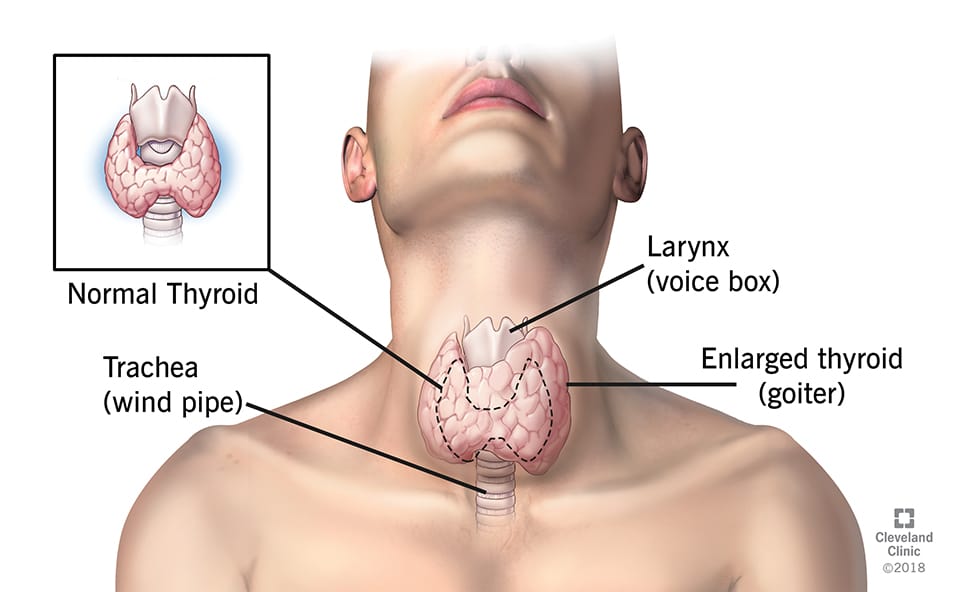Hashimoto’s disease is a rare kind of disease condition that occurs when your immune system begins to attack your thyroid gland.
The normal function of the immune system is to fight against diseases and harmful viruses that attack the body, however, it becomes a massive problem for the body if the immune system under any circumstance begin to attack the very body it is supposed to be protecting.
Your thyroid gland is a small gland, located below your Adam’s below at the base of your neck region. The thyroid gland is an essential gland that is vital in the endocrine system, and this is because it produces in large quantities a set of essential hormones that control important body functions.
Any damage done to the thyroid gland will cause a malfunction in the production of these hormones and hence cause a lot of problems to the body. Any form of inflammation caused by Hashimoto’s disease is also known as Chronic Lymphocytic thyroiditis which causes what is known as hypothyroidism(also known as an underactive thyroid gland).
According to research, this disease has been known to be one of the leading causes of hypothyroidism in the United States of America. Mostly, it has been seen to affect women who are in their middle ages; however, men, women (of any age bracket) and children can also be affected too.
Hashimoto’s disease is caused by an autoimmune disorder such that when your body creates antibodies which are meant to fight against foreign infections turns around to begin to attack the thyroid gland.
It is still a mystery to doctors; however, what causes the autoimmune disorder to occur in the first instance. In other words, doctors are still yet to discover what is causing the immune system to begin to function against the body organs(in this case, the thyroid gland).
Some scientists, however, are of the opinion that this turnaround is caused by the triggering of a bacteria or a virus, other scientists have been seen to believe that it could have been as a result of a genetic disease.
Although the cause of this rare immunological response is not known, it has been observed that some factors such as heredity, health and age have been seen to contribute to a person’s likelihood of developing this condition.
Risk factors
There have been some risk factors that have been seen to increase a person’s chances of developing this disorder, and they include:
1. Age
Hashimoto’s disease has been considered to affect women in their middle ages. This doesn’t mean that those people found in other age brackets can’t be seen to develop this disorder. However, most people who have been observed to have this disease are found within their 30s to 40s.
2. Sex
According to a recent research study, the tendency of a woman developing Hashimoto’s disease is three times higher than that of a man.
3. Heredity
A person is more likely to develop Hashimoto’s disease if any member of the family has had previous experiences with the disease or if any member of the family have had other related thyroid problems or any other autoimmune disease as the case may be.
4. Severe exposure to radiation
People who are exposed to several radiation rays such as x-rays, gamma rays, or beta rays are prone to develop Hashimoto’s disease later in life. Also, people who are exposed to environmental radiation likewise stand a higher chance of developing this disease.
Symptoms
We have spoken about quite a lot concerning this disease; however, there are general signs and symptoms a person who has developed this disease will exhibit and one must take note of. It is possible for a person to not detect these symptoms at first, but as time goes on, they will become more pronounced.
You may typically take note of a slight swelling around your throat and think this to be normal or something different, however, this may be your first sign that tells you, you have developed the disease.
Generally, Hashimoto’s disease progresses slowly over a couple of years hence causing slow but steady damage to the thyroid gland, and once this occurs, it will cause an intense drop in the thyroid hormone levels in the blood, and this can definitely lead to complications.
Generally, the signs and the symptoms of Hashimoto’s disease are the same signs and symptoms you will notice in a patient having hypothyroidism due to the damage or underachievement thyroid gland. Below are the signs to expect when having Hashimoto’s disease:
1. Intense tiredness and sluggishness
If you suddenly always feel fatigued all the time without ever having to do anything or go beyond your normal daily routine, then this is an indication of an underlying condition which may be related to hypothyroidism and by extension Hashimoto’s disease.
2. Increased sensitivity to cold
If you do notice that you have an increased susceptibility to cold and you are almost shivering under a little bit of cold, this could be an indication of fever or any other condition.
3. Constipation
Constipation can be a sign of overeating or not taking enough fruits, but after fulfilling the conditions of a healthy diet such as taking in plenty of vegetables and fruits, eating fewer carbs and so on but yet, you still feel constipated all the time, then it is time to go for that checkup.
4. Pale, dry skin
A classic symptom of hypothyroidism is pale dry skin. This is as a result of the reduced production of the thyroid hormone which in turn causes the skin to become cold and very dry.
Sometimes, the dryness can become so extreme such that there is no perspiration or sweating hence causing the palms and the sores to become very dry and thick. At times, the skin colour can turn yellow which is a result of a huge alteration of the metabolism of vitamin A.
5. A swollen face.
6. Brittle fingernails and toenails.
7. Enlarged tongue and tonsils.
8. Unexplainable weight gain.
9. Intense muscle pains and soreness
10. Severe pains and stiffness in the joints.
11. Depression and memory instability.
When to see a doctor?
You must see your doctor if you discover the following to keep occurring to you constantly
- You keep getting tired always sometimes even without doing anything
- Your skin is pale, dry and may even be turning yellow.
- You don’t sweat as you normally should.
- Your face is swollen for no cause and is also pale.
- Even after eating healthy, you still have to struggle with constipation.
- High blood cholesterol. This is because hypothyroidism may be the cause.
If you are experiencing the above-listed signs, then you must see your doctor immediately. Also, you must see your doctor if you have had the following:
- Previous Thyroid surgery
- Previous treatment with radioactive iodine or anti-thyroid medications.
- Previous radiation therapy to either your neck, head or upper chest region.
Complications
Since the cause of Hashimoto’s disease isn’t yet known, there is yet to be a permanent cure for it. However, this disease can be managed if caught early.
In some cases where the symptoms are left untreated and unmanaged, there are several complications which can arise and cause further health problems to the body. They include:
1. Heart-related problems
According to research and observations, it has been seen that Hashimoto’s disease can be associated with an increased tendency of developing a heart-related condition.
This is due to the fact that when the body has a reduced rate of producing thyroid hormones, the bad cholesterol tends to begin to form in the body.
One major complication with people who have hypothyroidism is an increased level of low-density lipoprotein which is otherwise known as the bad body cholesterol.
Once the level of the low-density lipoprotein is left to keep increasing, it can lead to an enlarged heart and furthermore, maybe cause heart attacks and eventually heart failure.
2. Mental Health related problems
A person who has developed Hashimoto’s disease has a high tendency of having depression at the onset of the disease, and also there is a risk of becoming more severe as the disease progresses over time.
Also, a person who is battling this disease has a tendency for low libido. This means that a man or woman who has Hashimoto’s disease will also have a decreased sexual drive and this can lead to reduced functioning of the patient’s mental capacity.
3. Myxedema
This is a rare condition that is related to Hashimoto’s disease. This condition is developed as a result of long-term hypothyroidism which comes from an untreated Hashimoto’s disease.
The first sign of this disease is severe drowsiness which is followed quickly by an intense lethargy and eventually unconsciousness and coma.
A Coma that is as a result of Myxedema is often triggered by the patient’s severe exposure to cold, infection, sedatives and other related stress on the body. This condition often needs prompt medical treatment else the patient might eventually lose his life.
4. Birth Defects
Babies who are born to women who have long-term untreated hypothyroidism as a result of Hashimoto’s disease have a higher chance of being born with congenital disabilities than babies who were born to healthy mothers.
According to research, doctors have long discovered that children who are born this way have the tendency of having intellectual and developmental problems as they grow older. One of such defects that have been related to hypothyroid pregnancies is cleft palate.
There is also another discovered connection between hypothyroid pregnancies and the brain, heart and kidneys of infants who were born. It has been discovered that these organs will not fully develop as it is meant to be and hence poses health problems to the infant.
Hence, it is often advised that if you are planning to get pregnant or you are already pregnant, kindly ensure that you check your thyroid level regularly to prevent any congenital disability to your baby.
It is important to note if you are already receiving hormonal treatments and therapy for hypothyroidism which is as a result of Hashimoto’s disease, you must go for all scheduled follow up visits as frequently as your doctor demands it.
It is also very important to ensure that you are taking the right dose of treatments all the time. After a while, depending on your body’s response to the treatment, your prescription to adequately improve your thyroid function may change.













